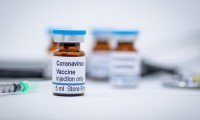-
Natural COVID-19 Infection Produces Robust T Cell Response and Memory to Fight Future Infections, Finds Study
- Source: https://www.hospimedica.com/covid-19/articles/294784403/natural-covid-19-infection-produces-robust-t-cell-response-and-memory-to-fight-future-infections-finds-study.html
- 242
- September 9, 2020
-
Oversensitive COVID-19 Tests Detecting Dead Coronavirus Cells, Driving False Positives and Reinfections
- Source: https://www.hospimedica.com/covid-19/articles/294784371/oversensitive-covid-19-tests-detecting-dead-coronavirus-cells-driving-false-positives-and-reinfections.html
- 192
- September 9, 2020
-
Testing Set to Begin on a Coronavirus Vaccine
- Source: drugdu
- 501
- May 27, 2020
-
What ingredients are in vaccines?
- Source: drugdu
- 896
- December 17, 2019
-
What ingredients are in vaccines?
- Source: drugdu
- 194
- December 17, 2019
-
Can the keto diet help beat the flu?
- Source: drugdu
- 197
- December 12, 2019
-
Can the keto diet help beat the flu?
- Source: drugdu
- 416
- December 12, 2019
-
Individuals with infection history have higher risk of developing Sjögren’s syndrome
- Source: https://newsroom.wiley.com/press-release/journal-internal-medicine/infections-linked-increased-risk-developing-sjoegrens-syndro
- 569
- April 12, 2019
-
If You Don’t Have This Gene, You May Recover Better from a Stroke
- Source: https://www.livescience.com/64837-ccr5-absent-stroke-recovery.html
- 355
- March 15, 2019
-
Metabolic Changes in Aging Cells
- Source: https://www.news-medical.net/life-sciences/Metabolic-Changes-in-Aging-Cells.aspx
- 401
- February 15, 2019
your submission has already been received.
OK
Subscribe
Please enter a valid Email address!
Submit
The most relevant industry news & insight will be sent to you every two weeks.







